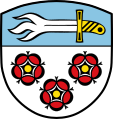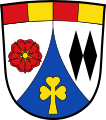Toerring

Toerring (also Törring ) is the name of a former high noble family from Upper Bavaria , which was first mentioned by 1120/1130.
history
According to Bavarian family tables, the ancestors of the Törring family can be traced back to the 8th century, namely Albeck Töringer , also called Alwicus I , who lived around 753, was married to Hitta von der Alm , under Duke Tassilo (probably Tassilo III. ) had served as chief hunter in Bavaria and was buried with his wife in the Wessobrunn monastery (formerly: Wessenbrunn ), the earliest ancestor known by name.
The ancestral castle Törring of the Knights of Toerring was located near the Waginger See in the now Upper Bavarian and then Salzburg town of Törring (now part of Tittmoning ). In 1210 the archbishop of Salzburg gave the Toerringern permission to build a castle on this site. The Lords of Toerring had the right to use the Bavarian standard when the ruler of the rule was personally in the field. Although not of dynastic descent themselves, nobles and knights served them as vassals .
They had been sitting on Stein an der Traun since the 13th century, and in 1369 the Counts of Törring became the lords of Tüßling . In 1377/1379 they received market rights from the dukes of Bavaria . In 1583 Johann Veit von Törring completed the conversion of Tüßling Castle into a stately Tüßling Palace. Since 1382 the Törringers were also on Pertenstein . In 1421 their ancestral seat Törring was destroyed in disputes with Heinrich the Rich of Bavaria and the stones were used to expand the Burghausen castle . From 1408 to 1464 Neudeck Castle was owned by the Törringers. Seefeld Castle on the Pilsensee has been family owned since the middle of the 15th century . The family was divided into the branches Toerring- Stein , Toerring- Jettenbach and Toerring- Seefeld .
In 1566 the family acquired the imperial baron status , and the Toerring was awarded the title of count at the Regensburg Electoral Congress in 1630 .
The Stein line expired in 1744 with Count Johann Franz Adam II von Törring-Stein (* December 16, 1700 - † February 3, 1744), but the Stein Castle on the Traun was sold to Count Fugger von Kirchberg in 1633 . The Törring-Stein branch had a family grave in the Baumburg monastery .
The 1745 by marriage acquired, the Westphalian Graf College associated County Gronsfeld was lost in 1794 by the French occupation. As compensation, the family received the former Reichsabbey Gutenzell ( Cistercian women ) in Upper Swabia according to § 24 of the Reichsdeputationshauptschluss of February 25, 1803 . This line, now Toerring-Gutenzeller and belonging to the high nobility , was mediatized in the Kingdom of Württemberg in 1806 and expired in 1860 with Count Max August Johann. From the last still blooming Seefeld-Jettenbacher line became Count Clemens Maria to Toerring-Jettenbach (* 1826, † 1891) of the Kingdoms of Bavaria and Württemberg in 1888 for recognition as the legal successor of the extinct unable magnificent house the predicate Grace .
Members of the ramified family were often appointed to the immediate circle of the Bavarian rulers or to leading clerical positions.
The family still owns extensive lands with agriculture and forestry in Pertenstein (since 1382), Jettenbach, Seefeld (since the middle of the 15th century), Pörnbach (since 1622) and Winhöring (since 1721) as well as breweries and gravel mining companies . The Jettenbacher brewery was first mentioned in 1426; Around 1500 the Toerring house received the privilege of brewing beer for sale from the ducal government, which is why the Jettenbach brewery has been operating there ever since. In 1998 the Graeflich von Moy'sche Hofbrauhaus Freising was acquired. Until 1974 the family ran the Uher factory, which they founded in 1952 .
The current head of the family is Hans Veit Graf zu Toerring-Jettenbach (* 1935).
Castle Pertenstein (since 1382 owned by the family)
Seefeld Castle (Upper Bavaria) (owned by the family since the middle of the 15th century)
Frauenbühl Castle in Winhöring (owned by the family since 1721)
Pörnbach Castle
Palais Toerring-Jettenbach (right) in Munich, opposite the Bavarian State Opera
coat of arms
Blazon
The coat of arms shows three (2: 1) gold-lined, red roses in silver as well as a helmet with a pointed hat made of ermine fur with a silver cover, which is covered with three red roses, as a seated helmet ornament , and a golden crown on the top of the hat from which emerge three red and silver ostrich feathers; the helmet covers are red and silver.
The roses from Toerring's coat of arms can still be seen today in some Upper and Lower Bavarian local coats of arms, including the former municipality of Törring, Aschau an der Inn, Jettenbach, Seefeld, Dörnbach, Inning am Ammersee, Wörthsee, Stein an der Traun, Simbach am Inn , Taching am See, Winhöring, Au in der Hallertau and Murwana Goslin (see coat of arms gallery).
Toerringer roses as a coat of arms element
Coat of arms of the former municipality of Törring in Tittmoning
Coat of arms of the community of Aschau am Inn
Coat of arms of the municipality of Jettenbach
Coat of arms of the Seefeld community
Coat of arms of the municipality of Pörnbach
Coat of arms of the municipality of Inning am Ammersee
Coat of arms of the municipality of Wörthsee
Coat of arms of the former municipality of Stein an der Traun
Coat of arms of the city of Simbach am Inn
Coat of arms of the municipality of Taching am See
Coat of arms of the Winhöring community
Coat of arms of the city of Murwana Goslin
Name bearer
- Hans von Toerring zu Seefeld and Jettenbach († 1555), noble landlord
- Albert von Toerring-Stein (1578–1649), Bishop of Regensburg from 1613 to 1649
- Ferdinand I of Toerring-Seefeld (1583–1622)
- Anna Maria von Toerring-Seefeld (1613–1682)
- Adam Lorenz von Toerring-Stein (1614–1666), Bishop of Regensburg from 1663 to 1666
- Maximilian Ferdinand of Toerring-Seefeld (1632–1683)
- Maximilian Cajetan von Toerring-Seefeld (1670–1752), captain of the life guard of Elector Maximilian II. Emanuel
- Leonhard Simpert von Törring-Jettenbach († November 1, 1734), Hereditary Land Hunter, Privy Councilor and Treasurer
- Philipp Joseph von Toerring-Seefeld (1680–1735), steward of Elector Maximilian II Emanuel
- Ignaz Felix von Toerring-Jettenbach (1682–1763), Bavarian Minister and Field Marshal
- Maximilian Joseph I of Toerring-Jettenbach-Raenkam (1694–1769)
- Max Emanuel von Toerring-Jettenbach (1715–1773), Privy Councilor and President of the Bavarian Academy of Sciences from 1762 to 1768
- Anton Clemens von Toerring-Seefeld (1725–1812), Privy Councilor, Chamberlain and Chief Chamberlain, author
- August von Toerring-Seefeld (1728–1802), elector treasurer and auditor
- August Joseph von Toerring-Gronsfeld zu Jettenbach (born August 10, 1728), Palatinate Chamberlain, President of the Court Council, historian, author, member of the Bavarian Academy of Sciences
- Maximilian Prokop von Toerring-Jettenbach (1739–1789), Bishop of Freising from 1788 to 1789 and Regensburg 1787/1789
- Joseph August von Toerring-Gronsfeld zu Jettenbach (1753–1826), Electoral Chamberlain and Councilor, President of the Council of State, theater writer
- Clemens Maria zu Toerring-Jettenbach (1826-1891) was a member of the commission that was supposed to pick up the incapacitated King Ludwig II in Neuschwanstein
- Hans Veit zu Toerring-Jettenbach (1862–1929), Bavarian politician
- Karl Theodor zu Toerring-Jettenbach (1900–1967), Bavarian entrepreneur
literature
- Jolanda Englbrecht: Three roses for Bavaria - the Counts of Toerring from the beginning until today. Pfaffenhofen 1985, ISBN 3-778-73264-1 .
- Otto Hupp : Munich Calendar 1899 . Book u. Art Print AG, Munich / Regensburg 1899.
- Stephan Kellner: The court brands Jettenbach and Aschau in the early modern period: Studies on the relationship between rule and Subjects in Old Bavaria using the example of e. aristocratic domain. Kallmünz 1986 ISBN 3-769-69937-8 .
- Friedrich Töpfer: History of the Counts Torringischen Schloss Pertenstein and the associated court brands Marbang and Sondermanning. Edited from the documents of the archives of the Counts of Torring. Munich 1847 ( Online PDF; 3 MB , original from the Bayerische Staatsbibliothek, digitized on May 7, 2010).
- Ernest Geiß: Heinz von Stein. In addition to a history of the castle and its owners. In: Upper Bavarian Archive for Patriotic History , Munich 3 (2), 1841, pp. 147–209 ( Online PDF; 22.2 MB ).
- Otto Titan von Hefner : Of the memorable and useful Bavarian Antiquarian , First Department: Adelicher Antiquarius . Volume one: The great nobility. Heraldisches Institut, Munich 1866, 418 pages, pp. 320–377 ( Online PDF; 11.9 MB , original from Bayerische Staatsbibliothek, digitized on February 11, 2010)
Individual evidence
- ↑ Family tables of the dukes of Bavaria and noble Bavarian aristocratic families , 1725. Stamm-Tafel A , p. 207 .
- ↑ Martinus Gerbert: Journeys through Alemania, Welschland and France which were employed in the years 1759, 1760, 1761 and 1762 . Ulm, Frankfurt and Leipzig 1767, pp. 374–176
- ↑ Johann G. Neunhoerl: echo dess dess life Leonhard Simpert of Törring and Wengling on Jettenbach / Aschau / Mödtling / Simbach and Stallwang . Munich 1735 ( e-copy )
- ↑ Friedrich Schlichtegroll : In memory of the two recently deceased members of the Academy of Sciences in Munich, Count Anton von Törring zu Seefeld ... and Joh. Nepomuk Gottfried von Krenner : read out at a public meeting of the academy on March 28, 1812, Munich, ( online , Bavarian State Library)
- ↑ On the education of the youth . Burghausen 1777 ( full text ).
- ↑ August von Törring zu Jettenbach and Gronsfeld: Excerpt from world political history, on the use of young gentlemen from the nobility in the Churlanden zu Baiern . Munich 1766 ( full text ).


















